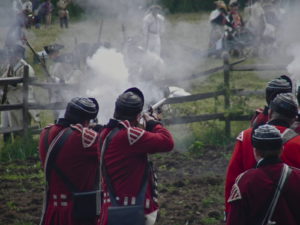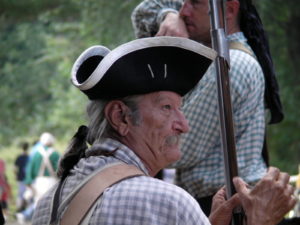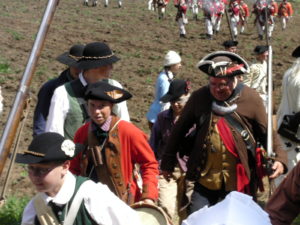I spent the weekend in a haze of gunpowder and sunscreen, visiting the largest American Revolution reenactment in New England at Old Sturbridge Village in Sturbridge, Massachusetts.
I visited this reenactment a couple of years ago when I was scouting out scenes for FORGE. In some ways, writing historical fiction might be easier than writing contemporary fiction. OK, not easier, exactly. Definitely more time consuming. And more maddening.
But you can make no assumptions when writing historical fiction; no assumptions about, say, how people pulled on their socks, or when they ate their breakfast, or how they greeted old friends.
In an early draft I’ll sketch a scene like “Curzon is seen by Trumbull. Tries to run. Is caught. Confrontation. Officer intervenes. Enlistment scene.” At first I picture this in a modern context. Once I have the actions and motivations of my characters, I do the primary source research that will enable me to write the scene in a manner that is as historically accurate as possible.
Visiting reenactments helps, but is not the key to all my problems. Because I can’t assume that the reenactors are getting it right. (If you allow other people to do your research, I can guarantee you’ll get burned.) But watching the reenactors has helped spark my imagination and set me on the path to some great scenes.
Ready…
Here is a poem for you, written by Emily Dickinson. Read it out loud a couple of times.
"Luck is not chance -- It's Toil -- Fortune's expensive smile Is earned -- The Father of the Mine Is that old-fashioned Coin We spurned --"
Set… turn off the phone, step away from the internet, and the tell the world you’ll be back in fifteen minutes. Or an hour.
Today’s prompt: Think of a scene or a story that you want to write, but that requires a lot of research. Jot down the central idea in a sentance or two. (If you can’t think of anything off the top of your head, consult the list you made yesterday.)
If you had all of the time and the money that you needed, how would you research this story? Be as detailed and specific as you can.
Bonus prompt: When your fifteen minutes is up, hop on the internet and see if you can find affordable and time-reasonable alternatives to your research ideas. For example, you may not be able to spend a week hiking in the Abruzzo region of Italy, but you can track down people who lived there, seek out Italian documentaries, contact photographers who have been there. I find that if I write a rough draft of a scene, then write the specific questions I need answered (What was the procedure for enlisting Continental soldiers in the fall of 1777? What was the promised pay? Term of enlistment? What evidence is there that these rules were broken? Where can I find actual enlistment documents? Who has studied enlistments in the period surrounding the Battles of Saratoga?) it motivates me to actually do the research. And then I can write.
Scribble… Scribble… Scribble!!!





I’m joining in a week late (we were on vacation last week) and wanted to tell you that I love your blog! It’s just what I’ve needed to get started with a story I’ve been wanting to write. One of my ancestors, Clara, was a Confederate spy and I want to write a YA story based on her adventures. Last summer, we visited the National Archives in DC and I found her name listed on some prison records from the Civil War. Seeing her name was a huge thrill for me. Anyway, today’s entry will be very helpful in getting started, so thank you!
One question, where do you find most of your historical research–online?
Thank you! Thank you! Thank you! This is the time of year when I usually give up my own writing in the rush to get things done, but I HAVE WRITTEN for 15 minutes every day! That includes driving 9 1/2 hours on two of the days, leading 7 youth plus one other adult on a mission trip for a week, canning tomatoes/spaghetti sauce, and getting ready to start teaching this week. I’ve given up the computer to draft by hand, and page by page my manuscript is growing. I even find that when I set a time for 15 minutes, I am much more focused and sometimes get more written that when I sat and stared at my computer screen for an hour. I definitely feel like this first draft sucks big time, but I did let my 12 year old daughter read it. Her comment? Mom, finish writing so I can read the rest of it. Maybe there’s hope after all.
It’s always so cool to read the accounts of someone else working in the genre and the way they approach the writing and research. Thanks! Your books are just fantastic!
K
Good challenge today!
While my writing, thus far, has been contemporary fiction, there are two historical fiction novels that speak to me. Well, the characters who lived long ago, speak to me
For the first time, I did ponder veering off the path of daily prompts. This surprised me. In my case, it would have been cheating. My usual writing does not give me credit towards my Fifteen Minutes with Laurie. (My own Betsy Rule.)
My Fifteen Minutes with Laurie is about being challenged. Not to spend fifteen minutes following my characters or listening to my muse, but doing something that scares me: writing what someone tells me to write. Writing it NOW. Without thinking; without judging.
(When I am in a room filled with writers and I hear everyone scribbling, scribbling, scribbling to some prompt given by the instructor, my pen hovers above the page, my fingers freeze into the shape of curly fries . . . )
I am overcoming this fear. Little by little. Day by day, until August is over and I will let go of Laurie’s hand and . . .
I will soar with confidence.
So, following my Betsy Rule, I wrote about researching the thirties in Princeton, NJ in a cost-effective manner. Yes, for fifteen minutes. Of course, this trailed off to wondering why I am compelled to write this particular novel: a fact I had not yet addressed until today.
And now, I do understand, thanks to Laurie!
I read a lot of books aimed at academics and use the sources they list in their bibliographies to track down primary sources. I can’t emphasize enough how important it will be for you to comb through primary sources and consult with historians. A lot of history written for mass markets is full of holes or misinterpretations.
It’s so interesting reading the posts from others. Our individual struggles are lonely ones, but still we have bond.
I liked today’s challenge. Up until now I have done no research but straight after reading this I went and searched the effects of sleep deprivation. Didn’t bother to read anything because I’m lazy and I can’t read information. It doesn’t soak in. Anyway, thank you for the encouragement. It’s much appreciated. I loved that you put a poem. I’m not that interested in poetry but Dickinson, Keats and Ellen Hopkins are all good poets.
My favourite poem is Aurora by Emily Dickinson.
Of bronze and blaze
The north, to-night!
So adequate its forms,
So preconcerted with itself,
So distant to alarms, —
An unconcern so sovereign
To universe, or me,
It paints my simple spirit
With tints of majesty,
Till I take vaster attitudes,
And strut upon my stem,
Disdaining men and oxygen,
For arrogance of them.
My splendors are menagerie;
But their competeless show
Will entertain the centuries
When I am, long ago,
An island in dishonored grass,
Whom none but daisies know.
Like Patti, I’m coming in a week late because of vacation. I’ve always worked on one project at a time, and loved your post about keeping more than one going (and what Jane Yolen does). Since I’m revising that project, I’m excited to “play around” with something new during my 15 minutes. Thanks for the inspiration, Laurie!
Nine is my luck number, so today was a great day with writing. It went a little longer than I planned, but I just let the words rule my brain for a while. It was nice not having to rush or anything, just being able to focus without worrying about anything I had to do. I just focused on me, the page, and the keyboard in front of me.
I have considered a historical fiction book before, but I’m not really sure where to start or anything like that. Until now, when I read your advice on writing Historical Fiction Laurie. Thanks for the advice. 😀
I’m signed up for two blacksmithing workshops at a local historical re-enactment site. The main character in my new novel is apprenticed to the blacksmith (1855), so this will be hands-on experience in lighting the fire, tending the forge, and pounding some red-hot metal. For me, the real value of this is the sensory experience of being in that shop. The guy who runs it is a stickler for historical accuracy. Of course, that doesn’t preclude the research, but it is a great place to begin.
Thanks so much for this post! I am writing a historical novel and your perspective on researching and writing these kinds of stories is helpful.
I did my time today!
My WIP on the back burner is historical fiction and I’ve been doing research off and on over the past three years. My time period is mainly the Spanish-American war, with some earlier 1890s life before the girl comes of age. I never enjoyed history class but I get lost in research–in a good way. I didn’t enjoy the majority of writing projects at school, either. HAVING v. WANTING to do something makes all the difference!
My great great grandmother wrote for a newspaper and was a published writer and poet. She left behind many writings including some that are autobiographical. I’ve always thought it would a great project to go through her papers in order to understand her, someone I never knew. Your prompt today really forced me to think about all of the different areas that I would need to research if I was to write a fictional story based on her life as a farmer’s wife in the 30s and 40s who also raised children and worked as a writer. I haven’t written in a while, so your daily words of encouragement have helped me find my way. Thank you.
It sounds like you had a great weekend. I always love hearing the background of historical novels.
I also had a great weekend with my sisters and parents. It is great to be back home with my laptop in order to continue working on my young adult novel in progress. While gone I had my writer’s notebook with me and captured different glimpses and moments.
I did it! Still here with ya!
This was a nice break from my WIP(s). I’ve had a character I’ve been working on for awhile. Her history is very important to who she is and I’ve been a bit negligent in developing her story. This prompt has given me the questions I need to answer to build her story.
Thanks!
I think research could be applied to contemporary novels, too. For instance, if you have a character who is on the swim team, what sorts of behind-the-scenes details can you add to the story that will help readers have a better feel for what it’s like to be on swim team, or to train? I’d love to research the “knotty hole gang” someday, or hang out with someone who is preparing for a bakeoff.
Todays’s lesson really helped me to remember to break down each goal into steps not just in my head, but on paper. Asking questions about what I need to know before doing the research is like making the grocery list before shopping. I am more likely not to forget something when I get there and more likey to come away with what I need.
Great lesson learned.